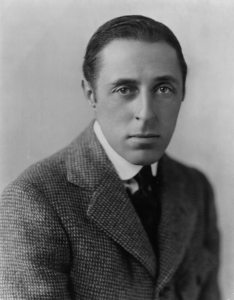
D. W. Griffith
David Llewelyn Wark Griffith, commonly known as D. W. Grifftith, was an American film maker who developed new directing techniques, being considered by many the “father” of Hollywood.
Born in 1875 in Crestwood, Kentucky, Griffith came from a rural poor family, and during his childhood and adolescence he suffered from the economic difficulties his family had, being forced to abandon school at an early age to start working, first at a grocery store and then at a book shop.
Griffith started his artistic career writing plays for theatre; however, his first works granted him no success, and only one of his plays was presented on stage. Due to this failure, young Griffith decided to pursue a career as an actor, and he appeared as an extra in several films.
It was in 1908, while working as an extra for a short film produced by American Mutoscope and Biograph Company, most known as Biograph, that Griffith had his first experience in directing. The director of the movie fell ill, and the studio offered Griffith his position, which he immediately accepted, having directed “The Adventures of Dollie”.
Since the beginning of his career, Griffith was a director that payed close attention to the details, demanding rehearsals before shooting every scene, and exploring all the potential of the film camera and the edition process. The world of cinema owes Griffith the introduction of fade-ins, fade-ours, long shots, follow shots and close-ups; moreover, through the use of innovative editing techniques, Griffith accomplished great success in the creation of narratives through moving images, resourcing to techniques like the flashback, that changed forever the way of telling stories in movies.
In 1915, Griffith’s movie “The Birth of a Nation” was released, a film that is still considered a mark in the history of cinema, and that was the first long film produced in the United States of America; however, upon its premiere, the film was very criticized, mainly due to the approach chosen to portray inter-racial relations.
Nevertheless, racial prejudice was a theme the Griffith continued to explore throughout his career, in movies like “Intolerance” or “Broken Blossoms”; the American history and common dramas of everyday life are the subjects in which Griffith focused the majority of his work. In 1921, Griffith had his first attempt in directing a movie with sound, but that didn’t granted him any success.
Griffith died in 1948, from brain hemorrhage, leaving a legacy of close to 520 films that include short and long films, and some special participations in directing.




